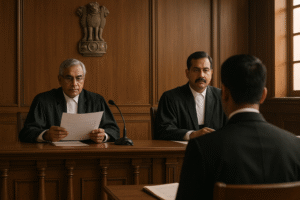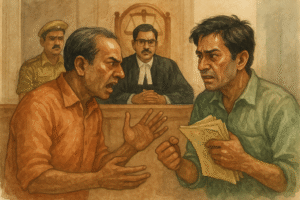Simplified Explanation of the Judgment
In a recent judgment delivered on 5th May 2025, the Patna High Court quashed a service tax demand order issued against a proprietorship concern on the ground that it was passed beyond the legally permitted time limit, without any valid justification for the delay.
The petitioner, a proprietorship firm, challenged both a show cause notice (SCN) issued in October 2021 and a final demand order dated May 2024. The dispute centered around an alleged non-payment of service tax of ₹13,07,700 for the period between April 2016 and June 2017. The notice claimed that the petitioner had willfully suppressed taxable income, invoking the extended five-year limitation period under Section 73 of the Finance Act, 1994, read with Section 174 of the CGST Act, 2017.
However, the petitioner argued that even if the extended limitation period applied, the law under Section 73(4B) required that the adjudicating authority conclude proceedings within one year from the date of issuance of the SCN. In this case, the SCN was issued in October 2021, and the final order came in May 2024 — a delay of over two years and seven months.
The petitioner submitted that there had been no action or movement in the case file for over two years, and the final order failed to provide any justification for this inaction. This inordinate delay, it was argued, defeated the very purpose of inserting a strict adjudication timeline in the law.
After reviewing the departmental records, the Court found that no steps were taken by the authorities between October 2021 and May 2024. Although the petitioner had submitted a detailed reply to the SCN in November 2021, this response was not acknowledged or acted upon during the intervening period. No hearing notices, internal file notings, or correspondence were produced to show active adjudication.
In light of this, the Court ruled that the order violated the mandate of Section 73(4B) and was thus legally unsustainable. It relied on multiple past decisions, including those in M/s Kanak Automobiles Pvt. Ltd., M/s Power Spectrum, and Pawan Kumar Upmanyu, where similar delays had resulted in the quashing of tax demands.
Significantly, the Court expressed concern over the repeated failure of tax authorities to comply with statutory timelines and directed the Chief Commissioner of CGST and CX (Ranchi Zone) to review procedural lapses in this and similar cases.
Significance or Implication of the Judgment
This decision reinforces the importance of procedural discipline in tax adjudication. The Patna High Court has clarified that even if a tax department invokes extended limitation due to alleged suppression, it must still adjudicate within the one-year period mandated by Section 73(4B) of the Finance Act, 1994.
The ruling protects taxpayers from prolonged uncertainty and arbitrary demands issued after inordinate delays. For the general public and businesses, it serves as reassurance that the judiciary remains vigilant about enforcement of timelines prescribed under the law. For government departments, it is a reminder to streamline internal processes and ensure accountability in tax administration.
Legal Issue(s) Decided and the Court’s Decision with Reasoning
- Whether the adjudicating authority violated the statutory time limit under Section 73(4B) of the Finance Act, 1994?
- Yes. The SCN was issued in October 2021, but the final order came in May 2024, exceeding the one-year limit.
- Was there any justification provided for the delay in adjudication?
- No. The Court found no movement in the case file for over two years. The petitioner’s reply was received in November 2021 but not acted upon.
- Can such a delay be condoned under the existing legal framework?
- No. While the law permits delay only when “not possible to do so”, the facts showed no genuine obstacles. The delay frustrated the goal of prompt tax resolution.
- What action did the Court take?
- The Court quashed the demand order dated 13.05.2024 and all consequential proceedings.
- It directed the Chief Commissioner to review the failure in timely adjudication and consider necessary administrative actions.
Judgments Referred by Parties
- L.R. Sharma & Co. v. Union of India, 2024 SCC OnLine Del 9031
- Sunder System Pvt. Ltd. v. Union of India, 2020 (33) G.S.T.L. 621 (Del)
- National Building Construction Co. Ltd. v. Union of India, 2019 (20) G.S.T.L. 515 (Del)
- Siddhi Vinayak Syntex Pvt. Ltd. v. Union of India, 2017 (352) E.L.T. 455 (Guj.)
Judgments Relied Upon or Cited by Court
- M/s Kanak Automobiles Pvt. Ltd. v. Union of India, CWJC No. 18398 of 2023, Patna High Court
- M/s Power Spectrum v. Union of India, CWJC No. 16772 of 2024, Patna High Court
- Pawan Kumar Upmanyu v. Union of India, CWJC No. 11975 of 2024, Patna High Court
Case Title
Pankaj Rai v. The Union of India & Others
Case Number
CWJC No. 11936 of 2024
Coram and Names of Judges
Hon’ble Mr. Justice Rajeev Ranjan Prasad
Hon’ble Mr. Justice Ashok Kumar Pandey
Names of Advocates and who they appeared for
Mr. Bijay Kumar Gupta — For the Petitioner
Dr. K.N. Singh, Additional Solicitor General — For the CGST & CX
Mr. Anshuman Singh, Senior Standing Counsel — For the CGST & CX
Mr. Shivaditya Dhari Sinha, Advocate — For the CGST & CX
Mr. Alok Kumar, Advocate — For the CGST & CX
Link to Judgment
a2aadc07-70e0-4de1-ac48-4ff82b6e2ad6.pdf
If you found this explanation helpful and wish to stay informed about how legal developments may affect your rights in Bihar, you may consider following Samvida Law Associates for more updates.







